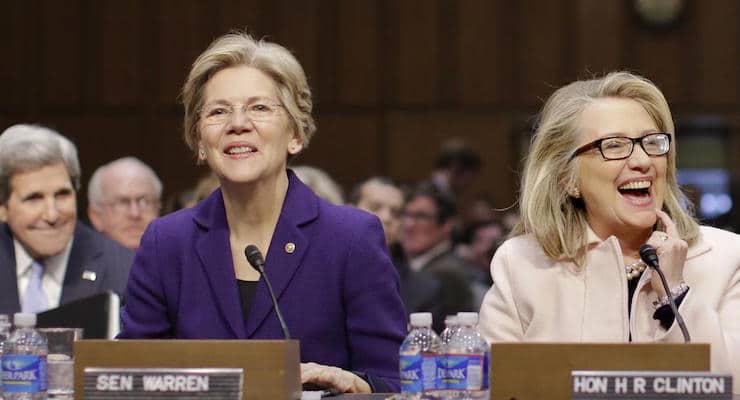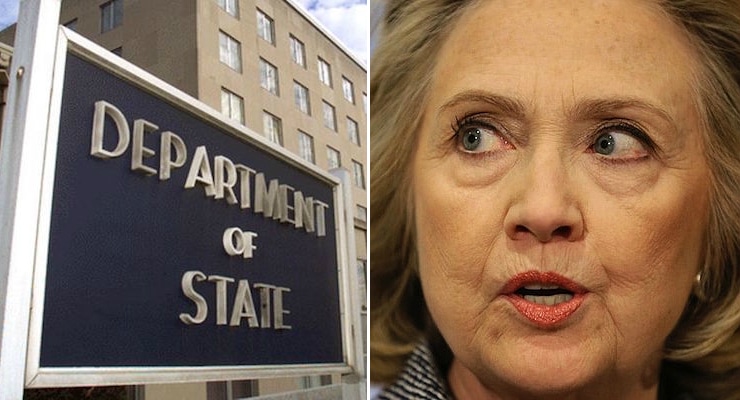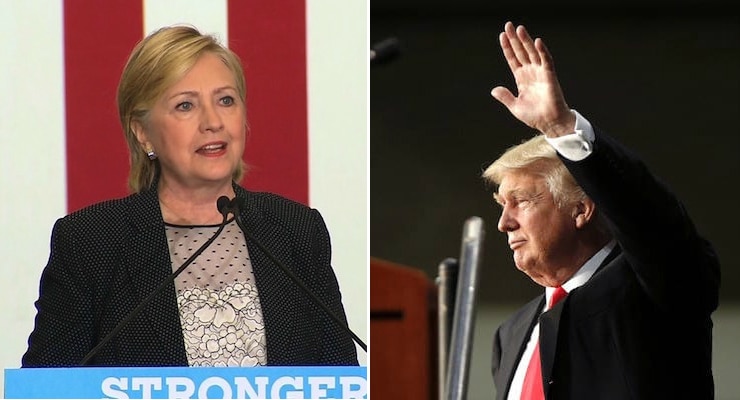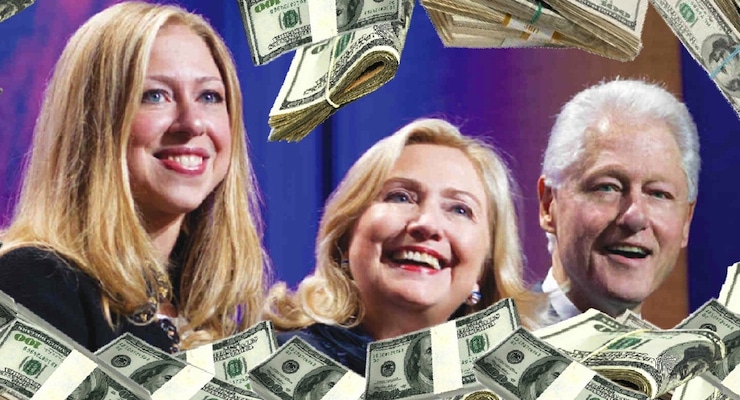
Bill Clinton, Hillary Clinton, Chelsea Clinton at the Clinton Foundation with money imposed over the photo. (Original Photo: AP)
Back in 2009, I shared some academic research showing the unsavory link between lobbying expenditures and bailout cash from TARP.
Just in case anybody naively thinks that such distasteful favor-swapping no longer occurs, here’s some more evidence. A column in the International Business Times summarizes some new scholarly research, once again showing the corrupt nexus between big government and the financial sector.
…analysis from London Business School professors Ahmed Tahoun and Florin Vasvari analyzed how the personal finances of congressional lawmakers changed once they were appointed to the Senate Finance Committee, the Senate Banking Committee or the House Financial Services Committee. It also evaluated how their finances compared with other lawmakers who are not on those panels. …the researchers found that finance committee members’ personal borrowing tended to jump in the first year they were appointed to the panels — a trend not seen for other lawmakers who were given seats on other powerful committees. Similarly, the data show that upon joining the finance panels, lawmakers tended to be given 32 percent more time — or on average 4 and a half years more — to pay back those new debts than loans they previously had and that other members of Congress have. The study found that lawmakers also “report more favorable debt terms when they join the finance committee, relative to other years and to the terms other congressional members obtain including those on other powerful committees.”
Needless to say, the companies aren’t giving special treatment to these politicians because of altruism. For every quid, there’s a quo.
…the influence may operate in the other direction, too. Looking at which particular financial institutions are lending to lawmakers, the researchers found that underperforming banks provided new — and bigger — loans to more finance committee members than to other Members of Congress. They say that because those firms could face more regulatory scrutiny and financial instability from new federal policies, they are more reliant on strong political connections than competitors that are in better shape.
In other words, if you can’t succeed by competing in the marketplace, then curry favor with politicians so that you can be propped up by big government.
Though companies presumably have learned from the Countrywide scandal to be more cautious about disguising the fact that they are dispensing goodies.
…mortgage industry titan Countrywide Financial created a “VIP loan unit” that gave lower mortgage rates and expedited loan processing services to lawmakers that oversaw legislation affecting the firm. …Democratic U.S. Senators Chris Dodd and Kent Conrad were cleared by the ethics committee, which said they did not knowingly seek the perks. The committee, though, told the lawmakers they “should have exercised more vigilance in your dealings with Countrywide in order to avoid the appearance that you were receiving preferential treatment based on your status as a senator.”
By the way, I’m not exactly shocked that the congressional ethics committee (wow, talk about an oxymoron) didn’t even bother slapping the wrists of the politicians who got the favors. After all, imagine how much harder it would be to raise campaign cash if politicians couldn’t use the coercive power of government to swap favors with interest groups.
But the folks on Capitol Hill are amateurs compared to Bill and Hillary Clinton. TheWall Street Journal explains that the charity they set up has basically been a scam to advance their personal and political interests.
The foundation served for years as a conduit for corporate and foreign cash to burnish the Clinton image, pay for their travel expenses for speeches and foreign trips, and employ their coterie in between campaigns or government gigs. Donors could give as much as they wanted because the foundation is a “charity.” …the foundation promised the White House when Mrs. Clinton became Secretary of State that the foundation would restrict foreign donations and get approval from the State Department. It turned out the foundation violated that pledge, specifically when accepting $500,000 from Algeria. The foundation also agreed to disclose donor names but failed to do so for more than 1,000 foreign donors until the failure was exposed by press reports.
Some readers may think it doesn’t matter where the money came from. What really counts is that the Clinton Foundation  used the money to make the world a better place, right?
used the money to make the world a better place, right?
Um, not exactly. Only pennies on the dollar were used for charitable purposes.
The rest of the money was a slush fund to finance the Clinton family’s political machinery.
If you think this sounds unfair to the Clinton Foundation, you may change your mind after reading this article from theDaily Caller. Here are some excerpts.
Clinton Foundation officials have ignored virtually all of the “best practices” urged by good governance organizations for public charities… Most glaringly, for example, the foundation’s insular board of directors…are among President Bill and Hillary Clinton’s closest and richest friends. The “good governance” movement in the nonprofit field has been gathering strength for two decades, but it clearly has yet to reach the Clinton Foundation. …Good governance groups also encourage well-managed non-profits to create dedicated oversight committees… The Clinton Foundation has none of those committees, according to its Internal Revenue Service 990 tax filings. …the Clinton Foundation spent $12.6 million on Bill Clinton’s 60th birthday party. The foundation recorded the expense as “fundraising expenses.” …In December 2014 the board approved a $395,000 pay package for Braverman to become the new CEO. But the next month he abruptly resigned. Politico reported that Clinton’s insular staff were appalled at Braverman’s attempts at reforms. Braverman never explained the reasons for his departure. But Politico believes it was a backlash from Bill and Hillary’s hardened loyalists and “mega-donors” who chafed at the notion of more openness and transparency.
If the Clinton Foundation was a truly private organization, it wouldn’t be anybody’s business whether how it operated.
 Moreover, it would be hypocritical for me to make that accusation. After all, I’m on the Board of the pro-tax competition Center for Freedom and Prosperity and the other Board members are long-time friends. And we don’t have a bunch of oversight committees since CF&P’s annual budget has averaged less than $200,000, which means such things don’t seem necessary (though we’ve managed to do a lot with a little, even earning a front-page attack from theWashington Post).
Moreover, it would be hypocritical for me to make that accusation. After all, I’m on the Board of the pro-tax competition Center for Freedom and Prosperity and the other Board members are long-time friends. And we don’t have a bunch of oversight committees since CF&P’s annual budget has averaged less than $200,000, which means such things don’t seem necessary (though we’ve managed to do a lot with a little, even earning a front-page attack from theWashington Post).
The real issue, however, is whether a nonprofit organization is genuinely private. In the case of the Clinton Foundation, ” the organization seemingly operated as a “pay-to-play” gatekeeper for goodies from the State Department?
Consider these blurbs from a column in the Wall Street Journal.
…more than two dozen companies and groups and one foreign government paid former President Bill Clinton a total of more than $8 million to give speeches around the time they also had matters before Mrs. Clinton’s State Department, according to a Wall Street Journal analysis. Fifteen of them also donated a total of between $5 million and $15 million to the  Bill, Hillary and Chelsea Clinton Foundation, the family’s charity… In several instances, State Department actions benefited those that paid Mr. Clinton.
Bill, Hillary and Chelsea Clinton Foundation, the family’s charity… In several instances, State Department actions benefited those that paid Mr. Clinton.
Here’s one of the examples discussed in the column.
…the capital of the United Arab Emirates asked for a facility to clear travelers for U.S. entry before they boarded planes so they could avoid delays when arriving in the U.S. …U.S.-based airlines, which have no direct flights between Abu Dhabi and the U.S., opposed the idea as a giveaway to the government-owned airline, Etihad Airways. …While Mrs. Clinton’s State Department and the Department of Homeland Security were working out a “letter of intent” with Abu Dhabi for the facility, Mr. Clinton sought permission to give a paid speech in Abu Dhabi. …On Dec. 6, 2011, U.S. officials signed the letter of intent. One week later, Mr. Clinton gave a 20-minute talk on climate change to the Abu Dhabi government environmental gathering. He collected $500,000, his wife’s disclosure report shows. In December 2012, Mr. Clinton sought approval for another speech in Abu Dhabi before the World Travel and Tourism Council…the speech was sponsored by three Abu Dhabi tourism agencies, all owned by the government. …Mr. Clinton gave a keynote address on the value of tourism. He was paid $500,000, his wife’s disclosure filings say. One week later, the U.S. and Abu Dhabi signed the final agreement for the facility. …Mrs. Clinton’s spokesman said it was “farcical” to suggest any connection between the speeches and the facility’s opening.
The “farcical” part of this is the notion that a) Bill Clinton is an expert on the “value of tourism”, and b) that his supposed expertise on the topic is worth $500,000.
Though I have to give Bill Clinton credit for getting good deals. When I give a speech, I’m content with simply getting the organizer to pay for a coach ticket and a hotel room.
But the L.A. Times reveals that Bill Clinton gets much better treatment, not even counting the giant piles of money funneled to the Clinton Foundation.
Clinton changed the rules of political speech-making for cash. He would push not just corporate hosts but also nonprofits and universities to pay fees well beyond what they were accustomed to. …He and Hillary Clinton would become so skilled at churning profits out of their lectures that they would net more than $150 million from speaking alone after he left the White House. …refusing questions that were not screened by his staff in advance. There is the nearly $1,400 bill for a day’s worth of phone calls from San Francisco’s Fairmont Hotel and the $700 dinner for two. …Clinton would demand in his contract to be shuttled by private jet from San Francisco to UC Davis, where he spoke at the Mondavi Center. The center had to appeal to its network of donors to find someone able to fly him the 70 miles, something it had never done and hasn’t since.
By the way, I don’t object to Bill Clinton being treated far better than me. But I do get agitated if he’s getting goodies because some interest group is participating in a pay-for-play scam based on favors from government.
And that does come out of my pocket, as well as from the pockets of every other taxpayer, consumer, and worker.
Speaking of pay-to-play, here’s a story from the Washington Examiner about some unseemly behavior from the Clinton Foundation.
A Clinton Foundation official asked an aide to then-Secretary of State Hillary Clinton if the government would allow the well-connected charity to accept a donation from an oil company with extensive ties to Iran. …The email shows Petronas, a Malaysian state-owned oil company, wanted to send CEO Shamsul Azhar bin Abbas to a Clinton Global Initiative event as a paying member. …Two months earlier, the State Department highlighted a $150 million contract between Petronas and General Electric in Malaysia. …David Bossie, president of Citizens United, said the timeline of the State Department’s announcement of the deal with GE should raise questions. “A month after the announcement, the Clinton Foundation staff is contacting the State Department saying, ‘Hey, we want to shake down the CEO, essentially, of Petronus, is that ok?’…,” Bossie said. “That is political crony capitalism — that’s the definition of it, is using your political contacts and your political achievements for financial gain for the foundation,” he continued. “Clearly, [there was] a conflict of interest.”
The only good news is that the proposed shakedown of Petronas apparently didn’t happen, though it’s unclear from the records whether this was because the company said no or because the idea was so over-the-top corrupt that it was rejected by the State Department.
Let’s close with a really nauseating example of Clintonian sleaze. A story inNational Review exposes how the family’s Foundation victimized the people of Haiti.
Their story goes back to 2010, when a massive 7.0 earthquake devastated the island, killing more than 200,000 people, leveling 100,000 homes, and leaving 1.5 million people destitute. The devastating effect of the earthquake on a very poor nation provoked worldwide concern and inspired an outpouring of…some $10.5 billion in aid, with $3.9 billion of it coming from the United States.
But all this money hasn’t helped the poor people of Haiti.
…very little of this aid money actually got to poor people in Haiti. …Port-au-Prince was supposed to be rebuilt; it was never rebuilt. Projects aimed at creating jobs proved to be bitter disappointments. Haitian unemployment remained high, largely undented by the funds that were supposed to pour into the country. Famine and illness continued to devastate the island nation.
Why didn’t all the money have a positive impact?
Part of the answer is that foreign aid generally ineffective. Another part of the answer is that Haiti has statist policies that inhibit growth and prosperity.
But a final part of the answer is that a bunch of grifters diverted the money to their own pockets.
Where did it go? …Bill Clinton was the designated UN representative for aid to Haiti. …his wife Hillary was the United States secretary of state. She was in charge of U.S. aid allocated to Haiti. …an interesting pattern involving the Clintons and the designation of how aid funds were used. …a number of companies that received contracts in Haiti happened to be entities that made large donations to the Clinton Foundation. …For example, the Clinton Foundation selected Clayton Homes, a construction company owned by Warren Buffett’s Berkshire Hathaway, to build temporary shelters in Haiti. Buffett is an active member of the Clinton Global Initiative who has donated generously to the Clintons as well as the Clinton Foundation. …the contract was never competitively bid for. Clayton offered to build “hurricane-proof trailers” but what they actually delivered turned out to be a disaster. The trailers were structurally unsafe, with high levels of formaldehyde and insulation coming out of the walls. There were problems with mold and fumes. The stifling heat inside made Haitians sick and many of them abandoned the trailers because they were ill-constructed and unusable.
Here’s another example of pay-to-play favoritism.
The Clintons also funneled $10 million in federal loans to a firm called InnoVida, headed by Clinton donor Claudio Osorio. …Normally the loan approval process takes months or even years. …InnoVida had not even provided an independently audited financial report that is normally a requirement for such applications. This requirement, however, was waived. On the basis of the Clinton connection, InnoVida’s application was fast-tracked and approved in two weeks. The company, however, defaulted on the loan and never built any houses. An investigation revealed that Osorio had diverted company funds to pay for his Miami Beach mansion, his Maserati, and his Colorado ski chalet.
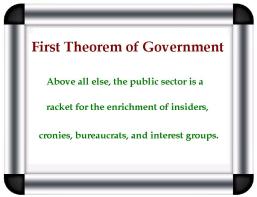 Gee, isn’t government a great racket!
Gee, isn’t government a great racket!
Here’s one final oleaginous example.
In 2011, the Clinton Foundation brokered a deal with Digicel, a cell-phone-service provider seeking to gain access to the Haitian market. The Clintons arranged to have Digicel receive millions in U.S. taxpayer money to provide mobile phones. The USAID Food for Peace program, which the State Department administered through Hillary aide Cheryl Mills, distributed Digicel phones free to Haitians. Digicel didn’t just make money off the U.S. taxpayer; it also made money off the Haitians. When Haitians used the phones, either to make calls or transfer money, they paid Digicel for the service. Haitians using Digicel’s phones also became automatically enrolled in Digicel’s mobile program. By 2012, Digicel had taken over three-quarters of the cell-phone market in Haiti. Digicel is owned by Denis O’Brien, a close friend of the Clintons. O’Brien secured three speaking engagements in his native Ireland that paid $200,000 apiece. These engagements occurred right at the time that Digicel was making its deal with the U.S. State Department. O’Brien has also donated lavishly to the Clinton Foundation, giving between $1 million and $5 million sometime in 2010–2011. Coincidentally the United States government paid Digicel $45 million to open a hotel in Port-au-Prince.
If you’re not thoroughly nauseated, read the entire article for many more examples of pay-to-play sleaze.
By the way, I’m not merely picking on the Clintons. Yes, they seem to be remarkably amoral in their approach to politics, but the underlying problem is that big government enables corruption regardless of who is in charge.
That’s the moral of the story.
P.S. Don’t forget that the Clinton Foundation easily got approved by the IRS while innocuous Tea Party groups were stonewalled. Another typical example of government in action.
[mybooktable book=”clinton-cash-the-untold-story-of-how-and-why-foreign-governments-and-businesses-helped-make-bill-and-hillary-rich” display=”summary” buybutton_shadowbox=”true”]


